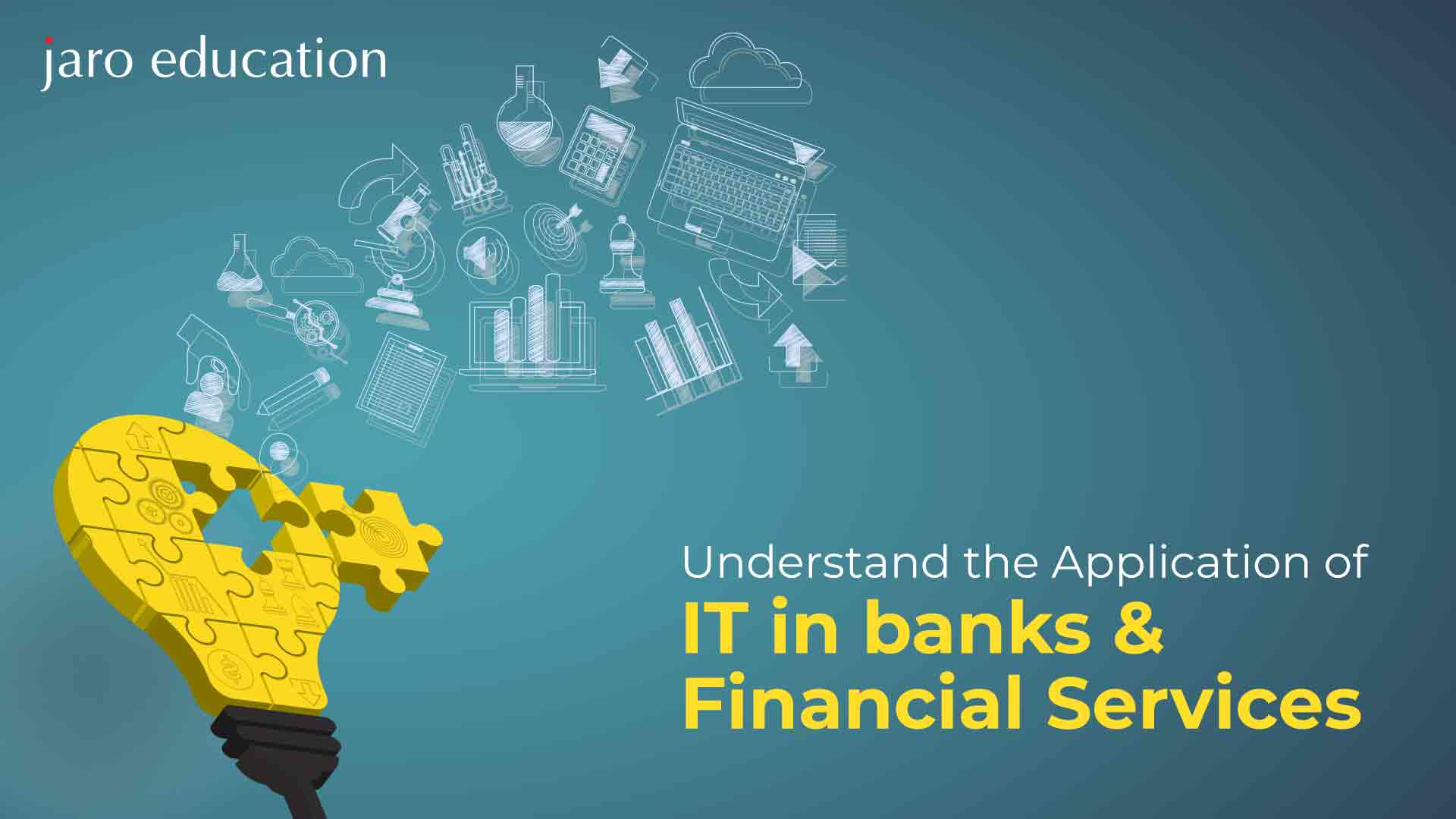Understanding the Application of IT in Banks & Financial Services

The application of information technology (IT) in banks and financial services plays a pivotal role. Effective client services and high-tech, intelligent security measures are essential for corporate success. Artificial intelligence enables machines to do various complicated tasks on our behalf. Financial institutions must employ technology to stay ahead of the curve. They should optimise the readily used information technology, and meet the most current market demands as technology has virtually permeated every industry.
To broadly understand the usefulness of IT in the banking and finance sectors, join the Post Graduate Certificate Programme in Banking and Finance – IIM Tiruchirappalli. This multidisciplinary programme gives workers essential skills and insights into how banks and other financial organisations function.
The Role of IT in Banks and Financial Services
IT has become an indispensable tool that enables these institutions to streamline processes, mitigate risks, and provide customers with seamless financial solutions. Let’s explore some key areas of the banking and financial sector where IT has made a significant impact:
Customer Service/Engagement: The Value of Chatbots
One of the primary benefits of deploying chatbots is their remarkable return on investment (ROI) in terms of cost savings. By automating routine tasks, like balance inquiries, accessing mini statements, and initiating fund transfers, chatbots free up human resources and reduce operational costs. This efficiency translates into tangible savings for businesses, enabling them to allocate resources more effectively.
Traditionally, customers would rely on service centres or internet banking platforms for assistance with their inquiries or transactions. However, chatbots offer a convenient alternative, providing instant support without the need for human intervention. Chatbots can also operate around the clock, offering 24/7 support to customers. They are always accessible, ensuring that customers can obtain assistance at their convenience. This accessibility enhances customer engagement and prevents delays in addressing their needs.
Table of Contents
Regulating Banking operations with AI
Artificial Intelligence (AI), utilising deep learning and natural language processing (NLP), can be crucial in reading and understanding new compliance requirements. As regulations frequently evolve, banks must stay aware of changes and promptly update their processes and workflows to ensure compliance. AI technologies can efficiently analyse and interpret complex regulatory texts, extracting key information and providing insights to help in decision-making.
While AI banking solutions cannot entirely replace compliance analysts, they can augment their capabilities and accelerate operations. AI technologies free up valuable human resources to concentrate on higher-value jobs that call for critical thought and knowledge by automating repetitive and time-consuming chores. This raises operational effectiveness while lowering the possibility of human error during manual processes.
Online and Mobile Banking
With online and mobile banking, customers now have access to a variety of banking services right at their fingertips. Through secure online portals and mobile applications, individuals can perform transactions, check account balances, transfer funds, and even apply for loans. This convenient and user-friendly approach empowers customers, allowing them to manage their finances efficiently and conveniently.
Data Analytics and Business Intelligence
Banks can get helpful information about customer behaviour, market trends, and risk patterns by utilising advanced data analytics and business intelligence solutions. These insights facilitate the creation of modern financial solutions, personalised consumer experiences, and well-informed decision-making.
Security and Fraud Prevention
As the financial sector faces evolving cybersecurity threats, IT plays a critical role in ensuring robust security measures and fraud prevention. Banks employ sophisticated technologies such as encryption, multi-factor authentication, and biometric identification to safeguard customer data and prevent unauthorised access. Continuous monitoring and proactive threat intelligence also help detect and prevent fraudulent activities, protecting both the institution and its customers.
Digital Payment Systems
Digital payment systems, including electronic fund transfers, mobile wallets, and contactless payments, have gained significant popularity. These systems offer convenience, speed, and enhanced security, providing customers with a seamless transaction experience while reducing the reliance on traditional cash-based transactions.
Predictive Modelling
Predictive analytics, general-purpose-semantic and natural language applications are some of the most prevalent cases when AI is used. Data can have unique patterns and connections that AI can identify, unlike traditional technology. These trends could point to neglected cross-sell or sales opportunities, operational data measures, or even revenue-impacting variables.
Efficient Evaluation of Investment
The process of valuing investments is complex and involves collaboration among teams responsible for different aspects of investment asset management, including product experts and portfolio managers. These teams need to consider various investment strategies to make informed decisions. Machine learning provides a solution to this problem by using applications that can handle vast amounts of data from diverse sources in real-time. These applications can learn biases and preferences related to risk tolerance, investments, and time horizon. By leveraging machine learning, financial institutions can enhance their investment evaluation process and make more accurate and informed investment decisions.
Application of IT in Banks & Financial Services: Potential Challenges
The broader implementation of advanced technologies like AI in the banking sector does not come without its challenges. From data security concerns to the availability of high-quality data, several obstacles must be addressed for banks to effectively utilise AI technologies. Let’s understand these challenges in further detail:
1. One of the primary challenges of deploying AI in banking is handling a vast amount of data that often contains sensitive information. It becomes crucial for banks to implement robust security measures to protect customer data. Collaborating with the right technology provider is important to make sure the availability of a large range of security options, safeguarding the integrity and confidentiality of customer information.
2. Banks require structured and high-quality data for training and validating AI-based banking solutions. Having reliable and representative data is crucial to ensure that AI algorithms accurately reflect real-life scenarios. Additionally, data must be in a machine-readable format to avoid unexpected behaviours in AI models. To address this challenge, banks need to continuously review and modify their data policies, ensuring compliance with privacy regulations and mitigating associated risks.
3. AI systems are extensively used in decision-making processes as they can minimise errors and save time. However, these systems may inherit biases from historical data or exhibit minor inconsistencies that can escalate into significant problems. It is essential for banks to offer an appropriate level of explainability for all decisions and recommendations made by AI models. Understanding, validating, and explaining the reasoning behind AI-driven decisions helps ensure transparency, accountability, and compliance, ultimately protecting the bank’s reputation and functionality.
Final Thoughts
Incorporating IT technologies is now a critical strategic requirement for success in the global banking industry, having changed from being a straightforward addition to current procedures. These days, it serves as the foundation for new organisational value propositions. IT technologies like AI are completely transforming the banking industry and will ensure that financial services are more innovative, secure, and efficient.
For uplifting your professional capabilities in IT skills relevant to the banking and finance industries, the certification course by IIM Tiruchirappalli will be absolutely relevant.
Take your first step toward a bright future by registering with Jaro Education right away. Increase your industry knowledge and learning experience while accelerating innovation in the digital banking and financial sector. The course’s broad curriculum includes case studies, group projects, the creation of term papers, simulations, and other activities. It promotes skill development and comprehensive advocacy by industry experts belonging to various notable organisations.

Popular courses
Admission Open

Post Graduate Certificate Programme in General Management – IIM Nagpur
- Duration: 12 Months
- Application Closure Date: 30th October, 2024
Admission Open

Post Graduate Certificate Programme in Applied Data Science & AI – IIT Roorkee
- Duration: 6-8 Months
- Application Closure Date: 10th September 2024
Admission Open

Financial Reporting and Corporate Governance IIM Ahmedabad
- Duration: 4 Months
- Application Closure Date: 5th August 2024





